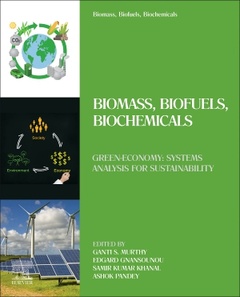Description
Biomass, Biofuels, Biochemicals
Green-Economy: Systems Analysis for Sustainability
Coordinators: Murthy Ganti S., Gnansounou Edgard, Khanal Samir Kumar, Pandey Ashok
Language: English
Subject for Biomass, Biofuels, Biochemicals:
Keywords
Systems thinking; Systems analysis; Archetypes; System dynamics; Analysis bias; Factfulness; Sustainable transitions; Techno-economic analysis; Payback period; Net present value; Cash flow analysis; Uncertainty; Real option analysis; Environmental impacts; Carbon footprint; Water footprint; Life cycle assessment; Matrix method; Input–output method; Risk; Risk assessment; Risk management; Risk communication; Ecological risk assessment; Variability; Land; Water; Fertilizers; Nitrogen; Phosphorous; Metals and minerals; Social-ecological systems; Resilience; Sustainability; Antifragility; Synchronous failures; Resilience thinking; Logic-based model; Sustainability Assessment; Evaluation procedure; Greenness; Dry grind corn ethanol; Corn stover; Agricultural residues; Ethanol; GREET; Solar PV; National solar mission; Solar parks; Off-grid systems; Agrivioltaics; Innovations; Photovoltaics; Wind energy; Electricity
418 p. · 19x23.4 cm · Paperback
Description
/li>Contents
/li>Biography
/li>Comment
/li>
2. Techno-economic Analysis
3. Environmental Impacts
4. Environmental Risk Analysis
5. Resource Sustainability
6. Policy, Governance and Social Aspects
7. Resilience Thinking
8. General Logic-Based Method for Assessing the Greenness of Products and Systems
Part II: Applications and Case studies
9. Biofuels in US (Bioethanol first and second generation)
10. Solar and Wind Energy in India
11. Solar and Wind Energy in US
12. Biofuels, Biopolymers and Bioproducts in India
13. Solar and Wind Energy in Europe
14. Renewable Energy and Decentralized Fertilizer Production
15. Regional Strategy of Advanced Biofuels for Transportation in West Africa
16. Advanced Biofuels for Transportation in West Africa: Common Referential State-Based Strategies
17. Semantic Sustainability Characterization: A Case Study
18. Solid Biofuels
19. Potential Value-added Products from Wineries Residues
Dr. Murthy’s research is broadly focused on sustainable bioprocessing. For any proposed technology or policy, Murthy group seeks to answer the question: “Is this approach technically feasible, economic viable, resource sustainable and has lower environmental impacts compared to alternatives? If not, how can we make it so. His group employs a combination of experimental and theoretical approaches using control theory, systems biology, process modeling, economic analysis and life cycle assessment (LCA) techniques to conduct molecular, cellular, industrial scale and systems level analyses of technologies to establish a sustainable bioeconomy. Recently, Murthy group has been trying to understand the nutrient-energy-water nexus at regional and global scale with particular focus on building resilience of agro-ecological systems to pulse and pressure disturbances.
Edgard Gnansounou is Professor of modelling and planning of Energy Systems at the Swiss Federal Institute of Technology Lausanne (EPFL) where he is Director of the Bioenergy and Energy Planning Research Group. His current research works comprise techno-economic and environmental assessment of bio-refinery schemes based on conversion of agricultural residues. He is leading research projects in that field in several countries including Brazil, Colombia and South Africa. Edgard Gnansounou is credited with numerous papers in high impact scientific journals. He is member of the editorial board of Bioresource Technology. He graduated with a M.S. in Civi
- Covers sustainability analysis for bioeconomy
- Provides theoretical background for conducting sustainability analysis
- Includes case studies from around the world that use these methods
- Examines techno-economic analysis, life cycle assessment, resource assessment, environmental risk analysis, policy and social aspects of technologies
These books may interest you

Sustainable Bioenergy Production 220.72 €


